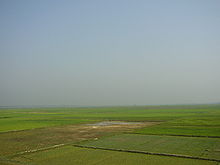|
Fenchuganj Upazila
Fenchuganj (Bengali: ফেঞ্চুগঞ্জ) is an upazila of Sylhet District in the Division of Sylhet, Bangladesh.[4] EtymologyThere are many theories behind the naming of the upazila. Some say that Fenchuganj is named after Penchu (or Fenchui) Shah, a guardian of Shah Malum's dargah, who had a habit of sitting at the ghat of the Kushiyara River during the evening every day. One day, he decided to open up a shop in the ghat, which eventually expanded into Fenchuganj or Fenchu's neighbourhood.[5] HistoryAfter the Conquest of Gour in 1303, some disciples of Shah Jalal migrated and settled in present-day Fenchuganj where they preached Islam to the local people. Shah Malum and Shah Mohabbat migrated to Mahurapur/Mourapur. In 1907, the Fenchuganj thana was established. Before 1907, it was a part of the Balaganj Thana. During the 1950 East Pakistan riots, the factory of a steamer company was looted and set on fire. Pulin De was murdered near Ilashpur village. under Fenchuganj police station, the houses of Ambika Kabiraj and Makhan Sen were looted and set on fire.[6] On March 23, 1971, at the Fenchuganj Fertilizer Factory Police Camp, under the leadership of Sheikh Tajmul Ali Chairman, one of the key organizers of the Bangladesh Liberation War, the Pakistani flag was lowered and the flag of independent Bangladesh was hoisted. During the Bangladesh Liberation War, The Pakistani army shot two gardeners at the gate of the Fenchuganj Fertiliser Factory in May 1971. The army then proceeded to the Manipuri Tea Garden, killing another two tea labourers. Dala Bridge (Ilash Pur)and,Kaiyer Warehouse is recognised as a mass killing site during the war and the Ghilachhora Monument stands out to commemorate the tragedies of the war. In 1980, Fenchuganj Thana was upgraded to an upazila.[4] AdministrationFenchuganj Upazila is divided into five union councils. The five unions are further subdivided into 29 mouzas and 89 villages:[7]
Geography Fenchuganj is located at 24°42′30″N 91°56′25″E / 24.7083°N 91.9403°E. It has 18,859 households and total area 114.09 km2. It is bordered by Golapganj Upazila to the north, Barlekha Upazila to the east, Kulaura and Rajnagar upazilas in the south via Tajmul Ali Chattar & Tajmul Ali Chattar-Maijgaon Rd and Balaganj Upazila to the west. DemographicsAccording to the 2011 Census of Bangladesh, Fenchuganj Upazila had 18,859 households and a population of 104,741. 27,132 (25.90%) were under 10 years of age. Fenchuganj had a literacy rate (age 7 and over) of 50.47%, compared to the national average of 51.8%, and a sex ratio of 1051 females per 1000 males. 21,841 (20.85%) lived in urban areas.[9] Ethnic population was 872 (0.83%).[10] As of the 1991 Bangladesh census, Fenchuganj has a population of 81605. Males constitute are 51.07% of the population, and females 48.93%. This Upazila's eighteen up population is 40383. Fenchuganj has an average literacy rate of 39% (7+ years), and the national average of 32.4% literate. [11] Religions: Muslim 88.72%, Hindu 11.25%, Buddhist and Christian 0.03%. EconomyFenchuganj Upazila has seven power plants, two urea fertilizer factories, three tea gardens, three rubber gardens, one gas field, Hakaluki Haor (largest Haour in South Asia) and many more.  Farms and industries
(First fertilizer factory planted in Asia) (Producer : Ammonia, Ammonium sulphate, Urea.)
(The biggest fertilizer factory planted in Bangladesh )
Transport Fenchuganj has good communication with the rest of the country because it has river, road and rail links. During British rule river and rail travel were popular, following that roads became more used, and more currently the A2( Asian Highway) road built through Fenchuganj, connecting Sylhet-Dhaka and other parts of the country. Established there is a market place on the bank of River Kushiara, with Tuesday and Saturday being the main trading days. People from the surrounding 10–15 miles come to the market to trade and shop. Now there are many local markets which sit every day. Among the views from Fenchuganj are both bridges over Kushiara. Hills around degree college, lake near degree college, Fertiliser factory [1.5 Km East of Tajamul Ali Square], tea estates, Delwar Hussain mosque, sunset from ilashpur (dhala) bridge and boat trip down the river are very enjoyable. Education Fenchugonj Upazila is performing 5.6% above the Bangladesh national average in education. The average rate of education is 68% in Fenchuganj. There are many educational institutions some of these are, Education
See alsoReferences
|
|||||||||||||||||||||||||||||||||||||||||||||||||||||||||||||||||||||||||||||||||||||||||||||||||||||||||||||


